#it highlights the values of friendship and bravery
Text
.
#ppl are so so critical of this season#like it wasnt perfect no#but i think its still a fantastic show#it highlights the values of friendship and bravery#i dont know why people wanted? or expected other characters to die such as steve/robin/nancy etc#max’s ‘death’ had the right impact it gives something for the kids to fight for- to get her back#opens a link to her and venca? theres lots of potential there#and how brave she was to do that to save her friends/town#and the way that highlighted her relationship with lucas such a powrful scene#and i hated eddies death ok sobbing but again it kinda made sense i hate to say it#like he died saving dustin and keeping the bats from the others#he chose to be brave and not hide and go out fighting#and ultimately it would have been hard to do much wirh his character if he lived right? he would have been arrested for those deaths#and he died helping get revenge for Chrissy#it was heartbreaking but also the emotion the ending of the season needed#idk i just am seeing so so much hate#but i feel like its positioned to give us a lot more in season 5#also i loved el’s progression this season#understanding completely what she can do and where she came from/that ahe created the upside down essentially#anyway lol dont hate me for this yall#there are def parts that could have been done better/needed better writing but#i also really love this show and think it gave us a lot considering the high stakes ending#im excited for the last 2 eps in season 5
2 notes
·
View notes
Text
Unveiling the Endearing Stories Behind American Girl Doll Names

American Girl dolls have been a cherished part of the American cultural tapestry for decades. The enchanting world of these dolls is not only about their meticulously crafted outfits and accessories but also about the narratives that underlie their names. Each American Girl doll name carries a unique story, often reflecting historical contexts, cultural significance, and personal inspirations. Exploring the origins and tales behind these names provides a fascinating journey into the heart of American heritage and the values these dolls represent.
The Historical Roots
The inception of American Girl dolls dates back to the mid-1980s when educator and entrepreneur Pleasant Rowland sought to create a line of dolls that could teach young girls about various periods in American history. The first three dolls, Kirsten, Samantha, and Molly, were introduced in 1986. Each of these names was carefully chosen to evoke a sense of historical authenticity and storytelling. Kirsten, representing a Swedish pioneer girl, reflects the influx of Scandinavian immigrants during the 19th century, while Samantha, set in the early 1900s, embodies the elegance and charm of the Edwardian era. Molly, a resilient character during World War II, symbolizes the courage and determination of American families during that time.
Cultural Diversity and Representation
As the American Girl brand expanded its collection, it embraced the richness of cultural diversity that defines the United States. Names such as Addy, representing an African American girl escaping slavery, and Josefina, symbolizing a Hispanic girl living in New Mexico in the 1820s, were introduced to illuminate the often underrepresented stories of marginalized communities. These names not only bring diversity to the American Girl collection but also serve as powerful tools for educating children about the importance of inclusivity and understanding different cultural backgrounds.
Embracing Contemporary Realities
Over the years, American Girl dolls have evolved to reflect modern sensibilities and social changes. Names such as Kit, reflecting the spirit of resilience during the Great Depression, and Julie, capturing the essence of the 1970s, resonate with the challenges and triumphs of their respective eras. Furthermore, names like Tenney and Z Yang highlight the brand's commitment to reflecting the diversity of contemporary America, emphasizing the importance of representing the multifaceted identities of girls growing up in the 21st century.
Personal Inspirations and Empowerment
Beyond historical and cultural contexts, some Top American Girl doll names are inspired by personal stories and values that resonate with young audiences. Names like Felicity and Rebecca reflect the importance of friendship and resilience, while Kaya embodies the spirit of adventure and the connection with nature. These names encourage young girls to embrace their individuality, follow their passions, and foster meaningful relationships, emphasizing the significance of empowerment and self-discovery.

Impact on Generations
The influence of American Girl dolls goes beyond playtime. The stories behind their names inspire young minds to explore history, embrace diversity, and cultivate empathy. Through the tales of bravery, resilience, and friendship embedded in these names, the American Girl brand has successfully created a platform for meaningful conversations about the complexities of the human experience and the importance of cherishing one's heritage and identity.
Cultivating a Sense of Identity
The process of selecting an American Girl doll often involves young girls connecting with a character whose name and story resonate with their own experiences or aspirations. This personal connection fosters a sense of identity and belonging, nurturing a positive self-image and a deeper understanding of the world around them. The meaningful narratives behind the names encourage girls to embrace their uniqueness and develop a strong sense of self-worth.
Inclusivity and Empathy in Play
American Girl dolls have become powerful tools for promoting inclusivity and empathy in play. By understanding the significance of each doll's name and the story it represents, children develop a greater appreciation for the diverse backgrounds and experiences that shape the American cultural landscape. This appreciation fosters empathy and a sense of understanding, nurturing a generation that values inclusivity and respects the richness of human experiences.
Conclusion
American Girl doll names serve as a gateway to a rich tapestry of history, culture, and personal narratives. Through these names, the brand has succeeded in fostering a deep appreciation for diversity, resilience, and empowerment. By intertwining meaningful stories with meticulously designed dolls, American Girl has created an enduring legacy that transcends mere playtime, leaving an indelible mark on the hearts and minds of generations of children. These names continue to inspire young minds, instilling the values of empathy, inclusivity, and the power of storytelling in the hearts of children across the nation.
FAQS
1. Can I change the name of my American Girl Doll?
While American Girl Dolls do come with their own unique names and stories, many owners often like to personalize their dolls by choosing different names. American Girl allows customers to change the name of their dolls, encouraging creative expression and personalization.
2. How are American Girl Doll names chosen?
American Girl Doll names are carefully selected to reflect the historical and cultural context of the characters they represent. The names are often chosen to be authentic to the time and setting of the doll's story, aiming to offer young girls an educational and immersive experience through their dolls' backgrounds.
3. Are the names of American Girl Dolls based on real historical figures?
Yes, many of the American Girl Dolls are inspired by or loosely based on significant historical events or figures. The names and stories of the dolls are often crafted to provide young readers with a window into different periods of American history, encouraging an appreciation for the diverse backgrounds and experiences that have shaped the nation.
3 notes
·
View notes
Text

🍽️ Happy National Waitstaff Day! 🍽️
Today, we celebrate the amazing waitstaff who serve us with a smile, making our dining experiences special. Let's take this opportunity to teach our kids the importance of gratitude, kindness, and service.
📚✨ At PlayfulSparks, we believe in stories that inspire and teach valuable lessons. Just like the dedicated waitstaff, our characters show us the beauty of helping others and working with a cheerful heart.
Check out our delightful children's books that highlight these wonderful values: www.playfulsparks.com
📖🌟 And don't forget to grab a copy of our most popular stories:
"Ecay And The Prince": A tale of honor and responsibility https://a.co/d/7sBh90p
"Red Stone and The Seven Descendants": An adventure of bravery and friendship https://a.co/d/gbERSPp
Let’s share stories that make our little ones compassionate and kind-hearted. ❤️📖
#NationalWaitstaffDay #Kindness #ServiceWithASmile #ChildrensBooks #PlayfulSparks #Values #Education #BooksForKids #Storytime #Parenting #Playfulsparks #PlayfulsparksProductionBDP #ForHire #LookingFor #Illustrator #Animator #Creative #Kidlit #Childrensbookillustrator #ChildrensBook #Kidsbooks #Author #Disney #Art #AnimationStudio #Mimai #Marketing #Advertising #Viral #Trending
#NationalWaitstaffDay#Kindness#ServiceWithASmile#ChildrensBooks#PlayfulSparks#Values#Education#BooksForKids#Storytime#Parenting#Playfulsparks#PlayfulsparksProductionBDP#ForHire#LookingFor#Illustrator#Animator#Creative#Kidlit#Childrensbookillustrator#ChildrensBook#Kidsbooks#Author#Disney#Art#AnimationStudio#Mimai#Marketing#Advertising#Viral#Trending
0 notes
Text
DON’T START WRITING A CHILDREN’S BOOK BEFORE KNOWING THIS
Writing a children's book is a wonderful venture that involves creativity, storytelling, and a deep understanding of your audience. Here are the essential steps to guide you through the process:
Step 1: Define Your Audience
Identify the age group you're targeting. Consider the language, themes, and complexity appropriate for that age range. Determining your target audience is a crucial initial step when writing a children's book. Here's a breakdown of age groups and considerations for each:
a. Board Books (Ages 0-3)
a) Language: Simple, repetitive, and rhythmic language. Words should be easy to pronounce and understand.
b) Themes: Basic concepts like shapes, colors, numbers, and simple narratives focusing on everyday routines or emotions.
c) Complexity: Minimal text, sturdy pages, and vibrant, high-contrast illustrations.
b. Picture Books (Ages 3-8)
a) Language: More varied vocabulary with descriptive language. May include rhymes, rhythms, or repetitive phrases.
b) Themes: Stories with relatable experiences, imaginative tales, moral lessons, and humor. Exploration of emotions and friendships.
c) Complexity: Short sentences or paragraphs, engaging illustrations integral to the storytelling.
c. Early Readers (Ages 5-9)
a) Language: Simple sentences, controlled vocabulary, and gradual introduction of more complex words.
b) Themes: Adventure, problem-solving, friendship, and relatable scenarios. Beginning to explore different genres.
c) Complexity: Larger fonts, limited text on each page, more detailed illustrations supporting the text.
d. Middle Grade (Ages 8-12)
a) Language: More sophisticated language, diverse vocabulary, and deeper exploration of emotions and character development.
b) Themes: Identity, self-discovery, adventure, moral dilemmas, family, and friendship. Introduction to more complex plotlines and genres.
c) Complexity: Longer chapters, fewer illustrations, and more intricate storylines.
e. Young Adult (Ages 12-18)
a) Language: Varied and mature language, exploring deeper emotions, and themes relevant to adolescence.
b) Themes: Identity, coming-of-age, relationships, societal issues, more complex plot structures, and genres.
c) Complexity: Longer narratives, diverse character perspectives, and themes that challenge and resonate with older readers.
Understanding the cognitive and emotional development of each age group will help you craft a story that resonates with your intended audience. Always keep in mind the language, themes, and complexities suitable for the chosen age range to ensure your story connects with readers in a meaningful way.
Step 2: Choose a Theme and Message
Decide on the core message or moral you want to convey. Ensure its relatable and understandable for your audience. Choosing a theme or message is fundamental in creating a meaningful children's book. Here's a guide to help you choose a compelling theme and convey a relatable message.
a. Understanding Themes:
Themes are the underlying concepts or ideas explored throughout the story. They offer a deeper understanding or lesson for the readers. Some examples include:
a) Friendship: Emphasizing the value of companionship, cooperation, and empathy.
b) Courage: Encouraging bravery, resilience, and overcoming fears.
c) Acceptance and Inclusion: Celebrating diversity, promoting kindness, and understanding differences.
d) Perseverance: Highlighting the importance of determination, effort, and not giving up.
e) Identity and Self-Discovery: Exploring self-awareness, individuality, and personal growth.
b. Choosing the Right Theme:
Consider these steps to select an appropriate theme for your audience:
a) Relevance: Ensure the theme is relatable and significant to your target age group. For example, younger children might connect more with themes like friendship or empathy, while older children might appreciate themes related to self-discovery or facing challenges.
b) Universal Appeal: Aim for themes that resonate universally, regardless of cultural or societal backgrounds, allowing a broader readership to relate to your story.
c) Engagement: Choose a theme that allows for engaging storytelling. Create characters and situations that effectively convey the message without being didactic.
c. Conveying the Message:
Once you've selected your theme, embed it naturally into your story:
a) Character Development: Show how characters navigate challenges or situations related to the theme, allowing readers to witness growth and change.
b) Dialogue and Actions: Use conversations and character actions to reinforce the theme without being overly explicit.
c) Emotional Connection: Engage readers' emotions by connecting the theme to relatable experiences or feelings.
Remember, a well-executed theme not only entertains but also leaves a lasting impact on young readers, fostering empathy, understanding, and growth.
Step 3: Develop Characters Create engaging and relatable characters. Make them unique, memorable, and aligned with your target audience's interests and experiences.
developing compelling characters is essential in captivating young readers. Here are steps to create memorable characters for your children's book:
a. Understanding Your Audience:
Consider the age group and their interests when crafting characters. Younger children might connect better with anthropomorphic animals or fantastical beings, while older kids might relate to more human-like characters facing relatable challenges.
b. Character Elements:
a) Distinct Personality Traits: Give your characters unique qualities that distinguish them. Consider their strengths, weaknesses, fears, and aspirations.
b) Relatability: Make them relatable by incorporating common experiences or emotions your audience can identify with.
c) Growth and Development: Allow your characters to evolve throughout the story. Show their journey and lessons learned, aligning with your chosen theme.
c. Steps to Create Characters:
a) Character Profiles: Develop detailed backgrounds for your characters, including their names, ages (if applicable), appearances, personalities, and motivations.
b) Visualize Characters: Sketch or describe your characters' physical appearances, considering how they'll be illustrated in the book. Ensure their appearances resonate with your audience.
c) Backstories and Motivations: Understand why your characters behave the way they do. What drives them? What are their goals? This depth adds authenticity to their actions.
d) Relatable Challenges: Give your characters challenges or conflicts that resonate with your audience. How they overcome these difficulties can convey your story's message.
Remember, children enjoy characters they can connect with emotionally, so focus on creating personalities that resonate while serving the purpose of your story.
Step 4: Plot and Structure
Outline the storyline with a clear beginning, middle, and end. Keep it simple but engaging, allowing for curiosity and interaction.
Crafting a compelling storyline with a clear structure is key to engaging young readers. Here are steps to outline your children's book plot:
a. Basic Story Structure:
a) Beginning (Introduction): Introduce characters, setting, and the main conflict or goal. Engage readers from the start by creating curiosity or setting the tone.
b) Middle (Development): Build upon the conflict, introducing obstacles or challenges that characters must overcome. This is where the bulk of the story unfolds, showing character growth and progression.
C0 End (Resolution): Resolve the conflict and conclude the story. Provide closure while reinforcing the message or theme.
b. Steps to Outline:
a) Identify the Conflict or Goal: Determine what challenge or objective your characters will face. Ensure it aligns with the theme and is relatable to your audience.
b) Create Plot Points: Outline key events or turning points that drive the story forward. Each plot point should contribute to character development or advancing the storyline.
c) Maintain Engagement: Incorporate elements that encourage interaction or curiosity, such as cliffhangers, mysteries, or moments that prompt readers to predict the outcome.
Additional Tips:
a. Simplicity: Keep the storyline simple and easy to follow, considering your target audience's comprehension level.
b. Engaging Narration: Use vivid descriptions, dialogue, and action to maintain interest and evoke emotions.
c. Pacing: Balance the pacing, ensuring a mix of slower moments for character development and faster-paced scenes to maintain excitement.
Remember, while keeping the structure clear, allow room for imagination and exploration within your storyline to captivate young readers' minds.
Step 5: Writing the Manuscript
Maintain a conversational tone, utilize age-appropriate language, and include dialogue and descriptive elements to bring the story to life. Writing the manuscript for a children's book involves several key considerations to engage and captivate your young audience:
a. Crafting the Manuscript:
a) Conversational Tone: Use a friendly and conversational tone that resonates with your target age group. Imagine reading the story aloud to children and aim for a natural flow in your writing.
b) Age-Appropriate Language: Tailor your language to suit the comprehension level of your audience. Use simple and familiar words, avoiding overly complex vocabulary or concepts that may be difficult for them to grasp.
c) Dialogue and Interaction: Incorporate dialogue between characters to enhance engagement. Dialogue can reveal personalities, advance the plot, and break up narration, keeping the story dynamic.
d) Descriptive Elements: Paint vivid pictures with words. Describe scenes, characters, and emotions using sensory details to stimulate imagination.
b. Writing Process:
a) Drafting: Begin by freely writing the story, focusing on getting your ideas down without worrying too much about perfection.
b) Readability: Ensure sentences are concise and easy to read aloud. Children's books often benefit from rhythmic and repetitive patterns that make the text enjoyable to hear.
c) Character Voices: If applicable, ensure each character has a distinct voice and manner of speaking, reflecting their personalities.
d) Engagement Hooks: Start the story with an engaging hook or introduction to immediately capture the reader's attention.
e) Revision and Refinement: Review and revise your manuscript multiple times. Ensure clarity, coherence, and consistency in the storyline and characters.
Read the manuscript aloud to gauge its rhythm and flow. Pay attention to where the story might lag or where the language could be improved.
Writing a children's book can be a rewarding experience, but there are certain pitfalls to avoid to ensure your book is engaging, age-appropriate, and well-received. Here are some things to avoid when writing a children's book:
a. Talking Down to Children:
Avoid using language that is overly simplistic or condescending. Children are often more perceptive than we give them credit for, so treat them with respect in your writing.
b. Ignoring Age Appropriateness:
Consider the age group you are targeting and tailor your language, themes, and content accordingly. Be mindful of vocabulary, sentence structure, and the complexity of the storyline.
c. Forgetting to Include a Moral or Lesson:
Children's books often have a moral or lesson. While it's important not to be overly didactic, having a positive takeaway can enhance the value of your book.
d. Lack of Diversity:
Ensure that your characters and stories represent a diverse range of backgrounds, cultures, and experiences. Children benefit from exposure to different perspectives.
e. Overcomplicating the Plot:
Keep the storyline simple and easy to follow. Children may lose interest if the plot becomes too complex or if there are too many characters to keep track of.
f. Ignoring Illustrations:
If your children's book is illustrated, make sure the text and illustrations work together harmoniously. The illustrations should complement and enhance the story.
g. Being Overly Didactic:
While it's great to have a lesson or moral, avoid being overly preachy. Children's books should entertain first and foremost. The lesson should feel organic to the story.
h. Neglecting Read-Aloud Appeal:
Children's books are often read aloud, so pay attention to the rhythm and flow of the language. Use engaging dialogue, descriptive language, and consider the cadence of your sentences.
i. Ignoring Feedback:
Don't be resistant to feedback, especially from your target audience (children or their parents). Constructive criticism can help you refine your work and make it more appealing to your audience.
j. Neglecting Editing and Proofreading:
Just like any other genre, children's books need thorough editing and proofreading. Errors in grammar, spelling, or pacing can distract from the overall enjoyment of the story.
k. Overlooking the Importance of Fun: Remember that children's books should be fun and enjoyable. Don't lose sight of the joy and wonder that comes with reading a good children's story.
By being mindful of these potential pitfalls, you can create a children's book that is engaging, age-appropriate, and memorable.
Remember, writing for children involves creativity, simplicity, and a deep understanding of your audience's needs and interests. Enjoy the process of crafting a story that will enchant and inspire young readers.
0 notes
Text
Dive into the excellence of selected works denny ja 19: dreams of ontel
In the world of Indonesia, Denny Ja is known as one of the most productive and talented writers. His works have gained a lot of confession and appreciation. One of Denny JA’s selected works to be sustained is “Ontel’s dream”. In this article, we will explore the excellence of the Denny JA 19 selected works as well as dig into the meaning and message it contains.
I. Background “Dream of Ontel”
“Ontel’s dream” is a short story written by Denny JA. The story is published in the poems of the Short Stories called “Denny Ja 19”. This essay poem consists of 19 short stories all written by Denny Ja. “Ontel’s own dream” is one of the most prominent stories and gains a special highlight of the reader and criticism.
Ii. Synopsis of Stories
“Ontel’s dream” told a story about a boy named Dani, who lives in a small village in the interior of Indonesia. Dani is a intelligent and imaginative child. He has an obsession with ontel, though in his village there is no Ontel bike he can have.
The story focuses on Dani’s journey in reaching his dream of having an ontel. It does every way to collect money to buy the ontel. On his way, Dani met with various obstacles and obstacles that tested the bravery and perseverance of the little boy.
Iii. The message and the meaning
“Ontel-like dreams” contain deep messages and meanings that can be applied in everyday life. First, this story teaches us about the importance of having a strong dream and determination to achieve it. Although Dani is from a difficult background, he has never lost his hope and continues to strive to create his dream of having an ontel.
In addition, this story also teaches us about the values of friendship and hard work. During Dani’s journey, he met new friends who helped him achieve his goal. They support each other and work together to overcome the obstacles they face. This teaches us that by working together and supporting each other, we can achieve whatever we dream of.
Iv. Excellence of selected works Denny Ja 19
“Ontel’s dream” is a real example of the excellence of Denny Ja 19. in this story, Denny Ja is able to convey strong messages with beautiful and stunning style. It also successfully describes the characters in the story with details and captivating the reader.
In addition, the organized story structure and the use of effective storytelling techniques make “Ontel -like dreams” become an exciting and entertaining story. Denny Ja is also capable of combining elements of realism and fantasy well, creating a unique and interesting story world.
V. Conclusion
In this article, we have dive into the excellence of Denny Ja 19’s selected works, which is “Ontel’s dream”. The story has inspired many readers with strong messages and deep meaning. With a professional writing style, Denny Ja succeeded in creating a heartbreaking and entertaining story.
Denny Ja’s works, including “dreams of Ontel,”, proves that Indonesian Sastra has great potential and is capable of producing scholarly works. Through this story, we are invited to appreciate strong dreams and determinations, as well as to always work hard and support each other in achieving our goals. May Denny Ja’s works continue to inspire and have a positive influence on the reader in the future.
Complete Check: Depression Denny JA Selected Works 19: Ontel Dream
0 notes
Text
“Matilda” by Roald Dahl Audiobook- Audicate
Download the App

Title: "Matilda" by Roald Dahl: A Tale of Magic, Mischief, and Audiobook Delight
Introduction
"Matilda" is a timeless children's novel penned by the renowned author Roald Dahl. This enchanting story has captured the hearts of readers young and old for generations. What's more, "Matilda" is now available as an engaging audiobook on the Audicate app, allowing readers to experience the magic and mischief of Matilda's world through sound.
The Story
"Matilda" is the tale of a remarkably gifted and intelligent young girl named Matilda Wormwood. She possesses an insatiable love for books and an extraordinary talent for telekinesis. Unfortunately, Matilda's parents are neglectful and her headmistress, Miss Trunchbull, is a tyrant. But Matilda's resilience and determination lead her on a journey to discover her true potential and stand up for justice.
Matilda: A Beloved Character
Matilda is a character beloved by readers of all ages. Her wit, intelligence, and bravery make her a role model for young readers. Roald Dahl masterfully portrays her as a symbol of the power of knowledge and the courage to challenge injustice.
Themes and Significance
"Matilda" explores several important themes:
Love of Learning: Matilda's passion for reading and learning showcases the joy that books and knowledge can bring into one's life.
Resilience: Matilda's ability to overcome adversity and stand up to bullies is an inspiring lesson in resilience and courage.
Friendship and Empathy: Matilda's friendships with Miss Honey and her classmates highlight the importance of empathy and kindness.
Justice and Morality: The story emphasizes the value of justice and doing what is right, even in the face of challenges.
Audiobook Experience on Audicate
The availability of "Matilda" as an audiobook on the Audicate app enhances the reading experience:
Immersive Narration: The audiobook is expertly narrated, bringing the characters and the magical world of Matilda to life with vivid descriptions and expressive voice acting.
Convenience: Audiobooks provide a convenient way to enjoy literature, making it accessible during commutes, long journeys, or simply for relaxation.
Enhanced Engagement: The audiobook format engages listeners with its immersive storytelling, making it an excellent choice for both children and adults.
Accessibility: Audiobooks cater to a wider audience, including those with visual impairments or learning disabilities, making literature more inclusive.
Conclusion
"Matilda" by Roald Dahl is a heartwarming and enchanting tale that celebrates the power of knowledge, resilience, and the courage to stand up for what is right. With the audiobook version available on the Audicate app, readers of all ages can now immerse themselves in Matilda's world and experience the magic of this beloved story in a new and captivating way. Whether you're revisiting Matilda's adventures or discovering them for the first time, the audiobook on Audicate offers a delightful and immersive reading experience that will leave you spellbound.
0 notes
Text
Winnie-the-Pooh Book Summary
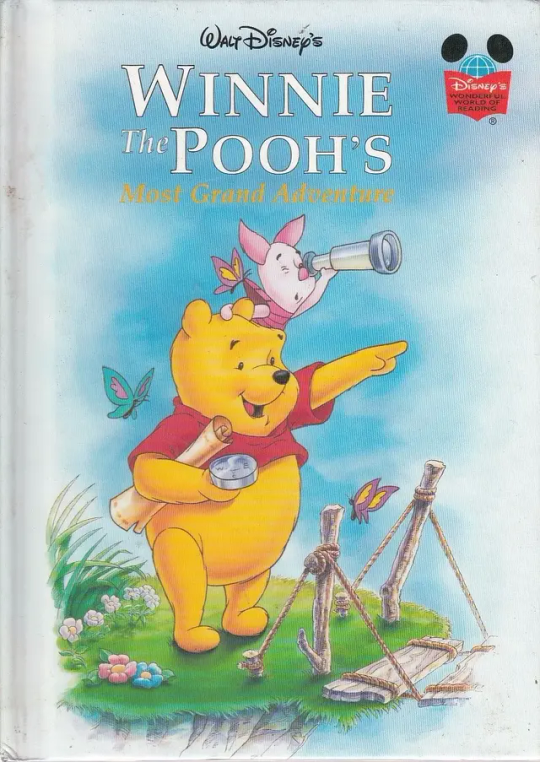
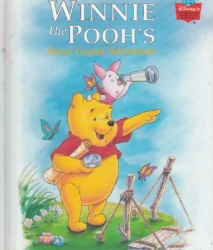
Winnie-the-Pooh Book Summary
Winnie-the-Pooh is a timeless classic that has been beloved by children and adults alike for nearly a century. A. A. Milne originally wrote the book in 1926, and it has since become one of the most popular children's books of all time. The story centers around Winnie-the-Pooh, a lovable teddy bear who is obsessed with honey. Along the way, he is joined by his animal friends, including Piglet, Tigger, Eeyore, and Rabbit.
The Hundred Acre Wood serves as the setting for the adventures that take place in the book. It's a magical place where anything can happen, and the animal friends are always up for a new adventure. From searching for honey to hosting picnics, there's never a dull moment in the Hundred Acre Wood.
Children love reading about Winnie-the-Pooh and his friends because they're all so endearing and relatable. Winnie is a playful and adventurous teddy bear who always manages to find the bright side of things. Piglet is timid and often scared, but he's also very loyal to his friends. Tigger is a bouncy and energetic tiger who is always ready to have fun. Eeyore is a melancholy and pessimistic donkey who still manages to be loved by all.
The book explores themes of friendship, loyalty, and imagination. It also touches on more mature themes like loss and the impermanence of life. Through the adventures of Winnie-the-Pooh and his friends, readers are reminded of the importance of these values in their own lives.
Winnie-the-Pooh is a must-read for children of all ages. The book has stood the test of time and continues to capture the hearts of readers around the world. So if you're looking for a charming and heartwarming story to share with your child, look no further than Winnie-the-Pooh.
Book Description
Winnie-the-Pooh is a children's book that revolves around the adventures of a lovable teddy bear named Winnie-the-Pooh and his animal friends, including Piglet, Tigger, Eeyore, and Rabbit. Set in the English countryside, the book is a collection of stories that explore the world of the Hundred Acre Wood and the various escapades of the animals.
The stories highlight the antics of the characters, ranging from their attempts to catch heffalumps and woozles to organizing picnics and birthday parties. Readers are taken on quests with the animals as they venture out exploring their world and getting into mischief.
The books' focus on the characters' relationships is crucial for their development and the creation of a compelling storyline. Winnie-the-Pooh, the protagonist, is playful and honey-obsessed, often leading his friends into trouble. Piglet is timid and afraid of everything, and his bravery often comes from a place of fear. Tigger is bouncy, energetic and loves to play and bounce around, and Eeyore is a gloomy donkey who is always sad and pessimistic.
The stories' locations often allude to the English countryside's idyllic beauty, characterized by rolling hills, meadows, and dense forests.
The book's humor and charm continue to captivate and entertain readers globally, and its reputation as a classic children's book has remained constant for nearly a century.
Character Analysis
Winnie-the-Pooh is the main character of the book. He is a teddy bear who loves honey and is always optimistic and cheerful. Pooh is known for his childlike innocence and his boundless imagination.
Piglet is Pooh's best friend, and he is a small, timid pig who is often afraid of everything. He is always willing to help and is loyal to his friends.
Tigger is a bouncy, energetic tiger who loves to play and bounce around. He is always ready for adventure and is known for his "bounce" and his laugh.
Eeyore is a gloomy donkey who is always sad and pessimistic. He is often down on his luck and suffers from a low self-esteem. Despite his gloomy outlook on life, he is a loyal friend who always finds a way to help his friends.
Each of the characters has their own unique personality traits and quirks, which make them memorable. Pooh's love for honey, Piglet's shyness, Tigger's energy, and Eeyore's gloominess all add to the charm of the book.
- Pooh - cheerful, lovable, honey-obsessed teddy bear
- Piglet - small, timid pig who is often afraid of everything
- Tigger - bouncy, energetic tiger who loves to play and bounce around
- Eeyore - gloomy donkey who is always sad and pessimistic
The characters are all lovable in their own way and are a big reason why Winnie-the-Pooh has become such a classic children's book.
Analysis
Winnie-the-Pooh is much more than just a collection of delightful stories for children. Many readers view the book as a symbol of childhood innocence and wonder, capturing the magic and joy of early childhood experiences. The story explores themes of friendship, loyalty, and the importance of imagination, reminding us of the simple pleasures of life.
However, the book also touches on more mature themes like loss and the impermanence of life. In the story, Pooh and Christopher Robin must part ways, reminding us that even our closest friends may one day leave us. The book also explores the idea of growing up and moving on, a bittersweet but necessary part of life.
Despite these more serious themes, Winnie-the-Pooh remains a charming and whimsical book that appeals to readers of all ages. Through the adventures of Pooh and his friends, we are reminded of the beauty and magic of childhood, sparking memories and emotions that we may have thought long forgotten.
Winnie-the-Pooh is a timeless classic that continues to capture the hearts of readers around the world. Whether young or old, everyone can appreciate the messages of friendship, loyalty, and imagination woven into its pages, making it a must-read for generations to come.
Reviews
Winnie-the-Pooh has become a beloved classic since its initial publication in 1926. The book has been highly praised for its memorable characters, charming storytelling, and gentle humor that is sure to delight readers both young and old. The gentle adventures of Winnie-the-Pooh and his friends have captivated generations of readers, and the book has been adapted into numerous films, TV shows, and other media.
The book's illustrations, done by Ernest H. Shepard, are also widely regarded as iconic. They perfectly capture the whimsical atmosphere of the Hundred Acre Wood and bring the lovable characters to life. Many readers have fond memories of reading this book as children, and it continues to be a beloved classic today.
One of the reasons why Winnie-the-Pooh has endured for so many years is its timeless lessons about friendship, courage, and the importance of imagination. The book shows that even the smallest of actions can have a significant impact on those around you, and that working together as a team can lead to great things.
Winnie-the-Pooh is a timeless classic that continues to delight and enchant readers of all ages. Its charming characters, whimsical storytelling, and gentle humor make it a book that can be enjoyed by everyone, whether you are reading it for the first time or rediscovering it as an adult.
Details
The book 'Winnie-the-Pooh' is divided into ten chapters, each of which tells a story about the adventures of Winnie-the-Pooh and his animal friends. Every story is self-contained and can be read as a stand-alone piece of literature. The first story in the book, "In Which We Are Introduced To Winnie-The-Pooh And Some Bees And The Stories Begin," introduces readers to the beloved characters of the Hundred Acre Wood.
The illustrations by Ernest H. Shepard are an integral part of the book and help to bring the characters and setting to life. From the whimsical illustrations of Pooh and his friends going on adventures to the delightful images of honey pots and picnic baskets, Shepard's illustrations are cherished by readers young and old alike.
Throughout the book, readers are transported to the idyllic English countryside where they can imagine themselves having picnics with Pooh and his friends or wandering through the woods on an adventure. The setting of the book adds to the whimsical feel of the stories and the characters' innocence and childlike wonder.
Each chapter has its own unique story that teaches readers valuable lessons about friendship, imagination, and the world around them. From "In Which Pooh and Piglet Go Hunting and Nearly Catch a Woozle" to "In Which Christopher Robin Leads an Expotition to the North Pole," readers are taken on a journey through the Hundred Acre Wood that they will never forget.
The book is suitable for all ages and is a timeless classic. The stories and illustrations continue to be enjoyed by generations of readers long after its initial publication in 1926. It's no wonder that 'Winnie-the-Pooh' remains one of the most beloved children's books of all time.
News About Winnie-the-Pooh
Exciting news for Winnie-the-Pooh fans! Disney has announced plans for a live-action film adaptation of the classic children's book. The movie, titled Christopher Robin, stars Ewan McGregor as the title character, who is all grown up and dealing with the stresses of adulthood. But he soon reconnects with his childhood friend, Winnie-the-Pooh, who is brought to life through a charming CGI animation.
This much-anticipated film is set to bring the Hundred Acre Wood to life once again, with all of your favorite characters making an appearance. Tigger, Piglet, Eeyore, Kanga, Roo, and Rabbit join Winnie-the-Pooh and Christopher Robin on their adventure, promising laughs and heartwarming moments for fans of all ages.
The film is directed by Marc Forster and written by Alex Ross Perry and Allison Schroeder. It promises to be a delightful mix of nostalgia and updated storytelling, with the same beloved characters we know and love from the books. Christopher Robin has already received positive reviews from critics and audiences alike, with praises going to the heartwarming story, the stunning recreation of the Hundred Acre Wood, and the incredible performances from the cast.
So mark your calendars, because Christopher Robin is set to hit theaters on August 3, 2018. Get ready to join Winnie-the-Pooh and his friends on a journey of friendship, adventure, and imagination like never before.
Ratings
Winnie-the-Pooh is a classic book that has been well-loved for generations. It comes as no surprise that it has garnered high ratings on popular book sites such as Goodreads and Amazon.
On Goodreads, the book has an impressive 4.2 out of 5 rating. Readers rave about the lovable characters, charming illustrations, and heart-warming stories that have captured the hearts of children and adults alike. Many reviewers also note the timeless themes explored in the book and how they continue to remain relevant today.
On Amazon, Winnie-the-Pooh has an even higher rating of 4.7 out of 5. Readers praise the book for its delightful storytelling, memorable characters, and thoughtful messages. Some also mention that the book has held up well over time and is a must-read for anyone who loves children's literature.
It is clear that Winnie-the-Pooh is a beloved classic that has stood the test of time and continues to resonate with readers of all ages. Its high ratings are a testament to its enduring popularity and impact.
Book Notes
Winnie-the-Pooh is more than just a single book, it is the first in a series that has become a classic in children's literature. The House at Pooh Corner is the second book in the series, and it was published in 1928, just two years after Winnie-the-Pooh. The book also includes several other works, such as When We Were Very Young and Now We Are Six, which include more poems and stories that feature the characters of Winnie-the-Pooh.
The characters in Winnie-the-Pooh were based on A. A. Milne's own son's stuffed animals. Milne enjoyed watching his son and his toys play together, and this inspired him to write the stories of Winnie-the-Pooh and his friends. The Hundred Acre Wood setting was based on the countryside near Milne's home in Ashdown Forest in East Sussex, England.
The books' characters, including Pooh, Piglet, Tigger, and Eeyore, have become beloved figures in popular culture, and their stories have been enjoyed for generations. Winnie-the-Pooh has stood the test of time, and it remains as popular and widely read today as it did when it was first published in 1926.
Furthermore, the books have been translated into many languages, and they have sold millions of copies worldwide. Both children and adults alike have been captivated by the charming tales of Winnie-the-Pooh, and his friends that act as a reminder to embrace our inner child and the magic of imagination.
The tales of Winnie-the-Pooh and his closest friends are timeless and have been passed down from generation to generation, and now, with an upcoming live-action film adaptation, it is likely that the tales of Winnie-the-Pooh will continue to be an essential part of popular culture for many years to come.
Read the full article
#Winnie-the-Poohbooknotes#Winnie-the-Poohcharacteranalysis#Winnie-the-Poohreviews#Winnie-the-PoohWinnie-the-Poohbookdescription
0 notes
Text
Gen 5 as a new generation of the elements of harmony...
Izzy- Sharing/self expression
Hitch- Conflict resolution/justice
Sunny- Unity
Zipp- Responsibility?? Community in the sense of helping others when they need it
Pipp- Communication/language or vulnerability/being open and inclusive to others
Thinking of it from a demographic- "telling a children's story"- standpoint, elements are a really huge product of the values during the times they were written in.
Thinking about the transition from the Elements of harmony- Magic, laughter, kindness, honesty, generosity, loyalty- then to the Pillars, written in season 7- Sorcery, hope, healing, bravery, beauty, strength- they're very interchangable in ways, yet highlight different necessary aspects of relationships. They're both meant to carry the storyline but also further portray the morals of the show's stories they're trying to get across.
I mean, the whole story with Starswirl and the other pillars was about the incredible sorcery and the unimaginable things they did. Then theres the elements, which are all about the magic friendship creates as well as each element's contribution. Then, I just kind of think about the moral they're trying to reach with this story- yes, we're different, but we can still unify together and be friends. How it's possible to be different together.
There's been such a big emphasis on teaching individuality in younger generations lately, it's definitely reflected in the newer generation of the show. Each of the main characters has their own traits, and I feel that- for better or worse- its been a story less about how their traits fit together and more of a "yeah, we're different, but we can still be cool and mesh together" with a huge focus on individuality compared to last generation. I saw a lot of that in the late seasons of gen 4 and see it, especially now in gen 5.
I think it'd be very interesting - if the new characters do represent the next incarnation of elements - to see what items are chosen to represent them. We saw it in the pillars with things like the shovels and masks, and then with the gemstones for the elements. I'd be curious to see what it turns out for those five- maybe it's the unity crystal. Maybe it's things like Pipp's lucky mic or whatnot. Maybe there's nothing at all.
#im not good at meta can you tell#this is just a ramble#gen 5#im def not emotionally attached to g5 in the way i was with 4 but its ok so far.#im really more interested in the continuation of the universe than the actual happenings of the... mane 5 i guess it would be for them
0 notes
Text
10 Underrated Quotes from Season 2 of The Mandalorian
As previously seen with season one, I’m here with another list of underrated quotes from The Mandalorian—this time, from season two. I’m going to highlight some of my favorite quotes from the season or quotes that stick out to me and why I think they’re noteworthy.
I don’t own any rights to content from The Mandalorian and, if you haven’t watched season two yet, potential spoilers are ahead!
1. “Pay attention when a superior addresses you.” (Chapter 15: The Believer)
While this scene certainly isn’t underrated, I believe this line spoken by Valin Hess when he finally catches Din Djarin’s attention by the Imperial terminal deserves some reflection. It’s interesting to think about how responding to Hess’ first call of “Trooper” is something Djarin just... wouldn’t think to do, or is something he thought he could get away with. It seems that Mandalorians, while they value their leadership, don’t focus on hierarchical structures in their society, so Djarin isn’t used to having to obey orders like that. It’s even worse that he has to deal with this unfamiliar situation without his helmet for the first time since he was a child. It really draws our attention to how little Djarin knows about the Empire and other organizations outside of his covert.
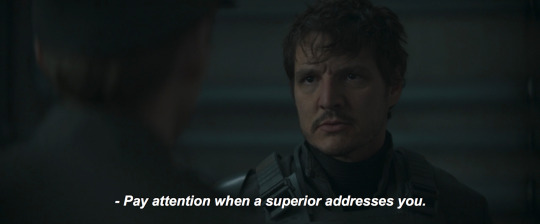
2. “This is the Way.” (Chapter 11: The Heiress)
I think many of us can agree that the first time this statement is uttered in this episode, we’re less than pleased about it, thanks to Bo-Katan’s ridiculing tone. When it happens later on, however, there’s so much meaning packed behind the words. First, from Bo-Katan, who has witnessed Mando’s bravery firsthand and has likely realized how wrong she was making assumptions about him based off his covert and his traditions. In return, Mando’s response of the phrase is strained. Why? Well, it’s up to interpretation—but to me, I think it’s because Mando’s in awe of the idea of these Mandalorians who have already proven their abilities to him actually coming to respect him and the Way he’s known ever since he was a child. It was a great moment of reconciliation.
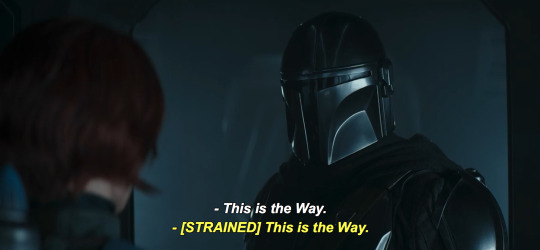
3. “Is he speaking? Do you... understand him?” (Chapter 13: The Jedi)
Something I love about this line in particular is the way it’s delivered. There’s such desperation concealed behind Mando’s modulator that tells us so much about what he’s been thinking while pacing the forest floor nervously. This desperation also tells us how eager he’s been to communicate with his child. Mando and Grogu have been together for a long time, now, and we know they’ve had plenty of one-sided conversations. I’m sure Mando has longed to know what Grogu’s been thinking in return, and now that he might have an opportunity to, we can really hear that sheer curiosity and desperation in his voice with this line he offers to Ahsoka.
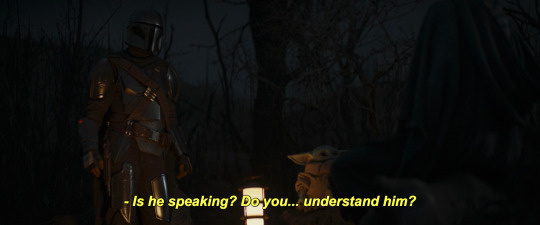
4. “Jet back, you’re faster that way.” (Chapter 12: The Siege)
I’m sure we all have our mixed opinions about the season one Nevarro crew, but this moment in particular really strikes the depth of their friendship and companionship. Once they’ve all heard about Moff Gideon’s return and his request to get the child once again, there’s no doubt in anyone’s minds that Mando wouldn’t be going back for him immediately. Even though the job isn’t completely done and Greef, Cara, and Mythrol all still need a way out, they don’t even try to ask for Mando’s help. Instead, Cara insists that he gets back as fast as he can, even if that means the three of them don’t make it out themselves. I really love how that shared understanding and dedication to the child in all situations shows their deep friendship amongst the trio (and Mythrol).

5. “I’ve spent much time on Tatooine. I never saw a Mandalorian there.” (Chapter 9: The Marshal)
Mando’s response to Gor Karesh insisting that he knows of a Mandalorian on Tatooine could potentially be telling us more than we’re aware of. As far as we know, Mando’s only been to Tatooine once—and it was only for two days, tops. But here, he’s saying he’s “spent much time” there, which means it’s possible that Mando lived on Tatooine for a time while the Bounty Hunter’s Guild still operated out of there. If you think about it more, Mando knew exactly where to go for some work in Chapter 5, another hint that there’s more to Mando’s time on Tatooine than we’re aware of. The same thing could be said about his knowledge of Tusken and his friendship with the Sand People. Any time we get a potential hint of Mando’s backstory, I’m excited about it!

6. “Am I under arrest?” (Chapter 10: The Passenger)
This line comes quickly in the midst of Mando’s conversation with the New Republic pilots in Chapter 10, but I really love it. These few words say a lot about Mando’s character and how he responds to praise. He’s just been told all about his heroics in Chapter 6, when he risked his own life for Lieutenant Davan and reprimanded Mayfeld, Xi’an, and Burg—and when asked whether it was true, Mando offers no confirmation. He doesn’t even own up to his good acts. Instead, he simply acts this question, remaining the practical man we know him to be. This truly shows us the humble nature of Mando and how he tries his best to focus on the present rather than dwelling on things he’s done in the past, good or bad.
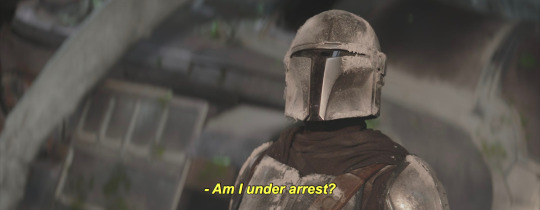
7. “... talent without training is nothing.” (Chapter 16: The Rescue)
On the surface, this seems like a very practical statement that many Jedi make throughout the series (see Ahsoka talking to Mando in Chapter 13 and Obi-Wan talking to Luke in Episode IV: A New Hope). When you think about it more, especially in context, you might be able to see Luke hinting at something much deeper. Luke heard Grogu’s cry for help from the Seeing Stone where it’s very possible Grogu was talking about his desire to protect his father by strengthening his abilities. Luke knows all too well what happens when you abandon training in an attempt to protect those you love—as for him, it didn’t go well. Yoda tried to warn him but he didn’t listen. Now that he’s learned his lesson, Luke can offer this wisdom to a Grogu who wants to keep his father safe. He knows that training first will then allow Grogu to protect himself and his father to his heart’s content, just as Luke was better able to protect his friends in Episode VI after he finished his training.
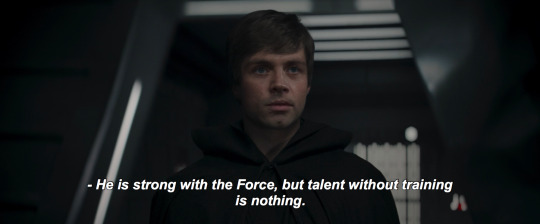
8. “Okay, I’m gonna protect you.” (Chapter 14: The Tragedy)
The scene in which this line is delivered is what truly establishes this episode as a tragedy. Mando’s tried three times to break through Grogu’s Force-field—not because he wasn’t thinking, but because he was so desperate—and now he has to come to terms with the fact that he’ll only hurt himself more if he keeps trying it again and again. Mando’s voice is pretty shaky if you listen to it closely enough in these lines, reluctant to leave his child atop the mountain alone but eager to protect him somehow. We know Mando doesn’t like to feel helpless, but we can sense he feels that way in this moment. He doesn’t even know if Grogu can hear him, yet he keeps speaking to him with such fierce protectiveness and reassurance. This is a promise he doesn’t fall through with, even if Grogu does fall into the Imperials’ hands for a time.
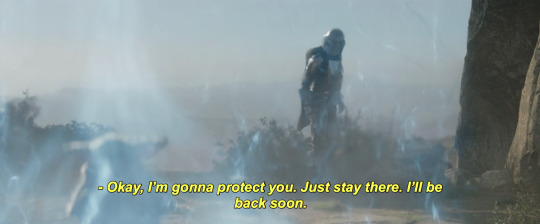
9. “Give it to me.” (Chapter 15: The Believer)
This is the moment where we all really knew what was about to go down. What I love about this quote is that Mando says it with no remorse. He says it firmly, insisting upon doing whatever it takes to get those coordinates and get to Grogu. He’s already made up his mind. Despite the fact he gave his word earlier about not showing his face, Mando’s going to do what he has to for his son. The firm way this line is delivered proves that, especially when he shifts from taking a backseat to Mayfeld to taking charge again as he pulls the data stick right from Mayfeld’s grip. I just really love Mando’s determination in this scene, despite the circumstances.
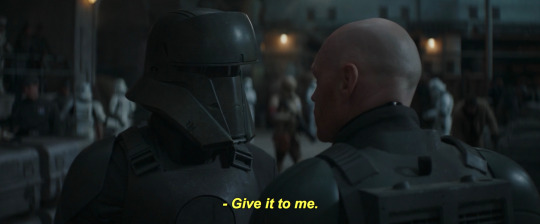
10. “I’ll see you again. I promise.” (Chapter 16: The Rescue)
Do I particularly think this line is underrated? No, not the direct meaning of it. But when you watch Star Wars Rebels and think more about the genius of Dave Filoni, there’s a whole new layer of meaning attached to these words. For those who may not have watched the show yet (you definitely should!), Kanan and Hera are two people who care very much for each other (wink wink) who once had to exchange a goodbye very similar to Mando and Grogu. Kanan was about to go on a very dangerous mission without Hera, unsure of what would happen to him, when he delivered these words: “We’ll see each other again. I promise.” This is almost exactly what Mando says to Grogu in the face of their temporary separation. The good news is Kanan and Hera did get to see each other again—but Kanan was changed forever. Will this happen with Mando or Grogu? It’s possible. But it’s just another one of those moments that makes me yell “FILONI!” in Darth Maul style.
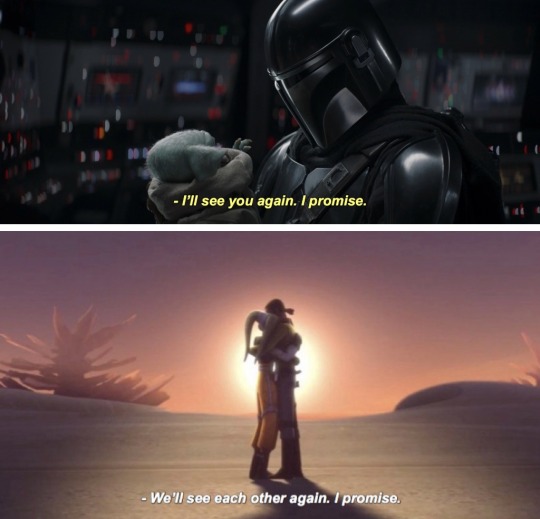
#idk i just love the mandalorian and star wars#the mandalorian#the mandalorian season two#star wars#meta
120 notes
·
View notes
Text
Remaining thoughts on Harry Potter and the Prisoner of Azkaban!
This book left me with so many warm feels! Sorcerer's Stone and Chamber of Secrets were definitely children's books, you can't say the same for Prisoner of Azkaban. This book might be my favorite so far in the 'hp a day' reread. Harry Potter series might not be a full Young-Adult genre yet however it is just entering that, and it did with as much poise as Firebolt!
This book got us so many Magical Creatures and new spells! The world-building of this book is beautifully done. Although a little jarring at times but cute nonetheless. Kappas derived from Japanese mythology, Grindylow from English folklore, Red Caps, Hinkypunk derived from Scottish folklore, and so much more. And creatures like Werewolf (and true wolf) were main plot points of the storyline.

We also got so many charms and spells... so many of them! I am so bloody glad for it! Every time a new charm or spell was introduced I made note of them, I want to list them all here however then this blog will be longer than it already is. Having said that I am happy about this development!
World-building did not stop at just spells and creatures, it stretch from children's games to the political dominion of Wizarding World. Since we're already on political dominion, I should make myself clear, Ministry of Magic is useless! Useless something drastic happens and Percy does make some SYSTEMATIC change, I don't think my opinion will change!

Since Percy is mentioned let's go through other Weasleys', shall we? Ginny is very few times mentioned but it seems she still has a crush on Harry but she has managed her crush very well. And Dementors have the same effects on her as much as they have on Harry. Then there is Fred and George, they are way better brothers to Harry than to Ron. For crying out loud, they gave Harry the Marauder's Map...
The traits of Slytherins are Cunningness and resourcefulness. Draco Malfoy, a Slytherin from a Pure-blood Slytherin family, downed a Holloween costume to scare Harry in Quidditch matches...Hence, Draco is in Slytherin House for the same reason as Harry is in Gryffindor. If you know then you know, I won't expand on it...

Hermione Granger, what a fucking great character! From this book onwards she is actually coming onto her own. She wanted to study, she did exactly that but when she thought a subject is not teaching her any value then she was brave enough to walk out of it. By the end of the book, she also learned that she indeed bite off more than she can chew. Also, her matter-of-fact thinking, her bravery, her love and dedication(for studies), her snobbishness, and all shine through each and every chapter.
All the good things aside, I do have to say, this book highlighted her shortfalls as a witch and a human. She is a loner, yes, she is! If Harry and Ron wouldn't have saved her from a troll in the first year then she wouldn't have been their friend, in fact, she wasn't their friend in the beginning! Hermione's dealing with Lavender's Rabbit's death, was more like "I am not like other girls" dealing. She is quickly becoming "I am not like other girls" girl, "she is different" girl, "she likes to read books" girl, "she doesn't know how/ doesn't like make-up" girl, "she is one of the boys" girl, if you know then you know! Hermione doesn't have any friends (female and others) other than Ron and Harry. She DESPERATELY needs Ginny and Luna in her life. Honestly... I need Ginny and Luna in Hermione's life. Movies have made Hermione a one-man army hero. and she is indeed a hero however she is a 13-year-old girl, she needs people in her life that can show her the wonders of life (and female friendship)! I hope I don't have the Mandela effect, Hermione and Ginny become truly great friends and we will get to see how awesome female friends can be in future books...
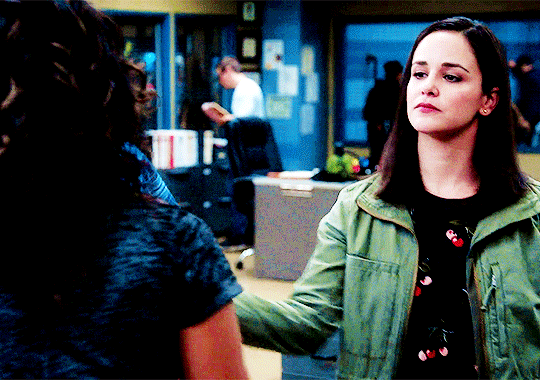
Hermione's relationship with Ron had so many ups and downs. I loved every part of it, even those when Ron and Hermione were at the cross. Hermione stood up for her pet and Ron did the same thing and Harry got his first test at being a third wheel to his best friends!

Since we are on the topic of Ron and Hermione, let me rant about the movie. Everybody, I mean everybody (even YouTuber Nerwriter1 has a video on it) has put "Harry Potter and the Prisoner of Azkaban" and the best one in movies ranking. Honestly, I understand why is that. The director is an Oscar winner, and the visuals are beautiful, the music is heavenly. However, story, the characters were butchered! Sirius is not a Rock star bad boy, he is a desperate Godfather who wants to connect with his Godson. Hermione is not a one-man army hero, she is a hardworking intellectual. Ron is not a jokester, he is a brave and loyal best friend who stands up for his best friend in front of mass murder. Snape has a lot more importance to the story than just appearing at the last minute in the third act. Having said that Remus Lupin might be the only character that got this movie right. Other than every character is pretty much butchered to fit for the movie. It should not have bothered me but it did! Because this movie affected future movies massively. The characters like Ron and Hermione were sacrificed. Ron's character in movies is ruined from now on but Hermione is a totally different character in the movies and in the books. So, every time I read any fanfics, I can easily identify which is the movie Hermione and the book Hermione. and surprise surprise; the movie Hermione is a lot more written than the book Hermione... Emma Waston is good and all but Hermione Granger in the book will always have my heart!

Coming back to the book, Sirius and his twist is not really a surprise to me or to anybody yet it is done comprehensively. There are reveals after reveals, twist after twist, loyalties tested among friends. Every reader's view is changed after the first read, what you know is not always the whole story. More than that Harry has something now that he did not have in the last two books. A family! Harry has his Godfather! Sirius Black! He might be on run but dear god, I am so happy he is here!
That has me thinking about the importance of that brief interaction between Sirius and Harry. Harry's only linking to his parents. So of course Sirius has a great effect on Harry. However, Harry picked up some negative things from Sirius. For example, Harry's hatred for Snape stepped up a notch because of Sirius's hatred for Snape. Sirius also indirectly taught Harry his first lesson in 'disregard in authority'. Let me explain, "I thought you'd come and help your friend. Your father would have done the same for me," said Sirius when Harry came to save Ron. That's nice and all but Sirius is still Mass Murder if he wasn't Harry's Godfather and a real DEATH EATER, what were the chances of these three 13 years old students have lived through the night? That little seed of not looking for any teachers or adults in crisis was always there in Harry but Sirius solidified that.
Harry in the last two books has done enough disregarding the authorities on his own. In Sorcerer's stone, he thought Snape wants the stone. So with his friends went on his own without listening to Professor McGonagall. In the second book, he thought Draco was a Slytherin heir. So, he again went on his own. In both cases, he and his friends ended up in the hospital wing. See, Harry doesn't NEED to learn that we have to question the authorities, he ALREADY does that (with as much grace as of newborn deer) yet Sirius, here, has indirectly taught Harry that authorities should not be trusted, going a step up to not only question the authorities but degrade them. It is not helped that later where Harry has to (because of Dumbledore's plan) take a bunch of Dementors all alone without any other adult, ALONE! FACING DEMENTORS! Thank god Harry is a talented wizard...
Here I will make my own point moot... well, I guess, Sirius was right, Cornelius Fudge (the ultimate authority, Minister of Magic) was ready to sacrifice an innocent man without listening to any reason. What I am trying to say is that there are many causalities that could be avoided if Harry and his friends had a bit less disregard for authorities. With all that said, newfound distrust in authorities, Harry, Hermione, and Ron, our golden trio will still trust Dumbledore, unfortunately...

This is a very small thing however in chapter 12 when Snape substituted for Lupin, the interactions between Snape and his students were somehow heart-touching to me. I can't really explain it well but the rapport among them was a bit unpleasant but familiar nonetheless!
That's it from me. Thank you for reading!
#harry potter fandom#harry potter#hp a day#harry potter re reading#harry potter series#hp fandom#potterhead#hp books#hp movies#spoilers#harry potter and chamber of secrets#harry potter and the chamber of secrets#harry potter movies#harry james potter#hp reread#hp#ron weasley#hermione granger#sirius black#remus lupin#harry potter and the prisoner of azkaban#spells#witchcraft#spellwork#magical creatures#ministry of magic#fred weasley#fred and george#george weasley#ginny weasley
5 notes
·
View notes
Text
Princess Charming And The Gentleman in Distress
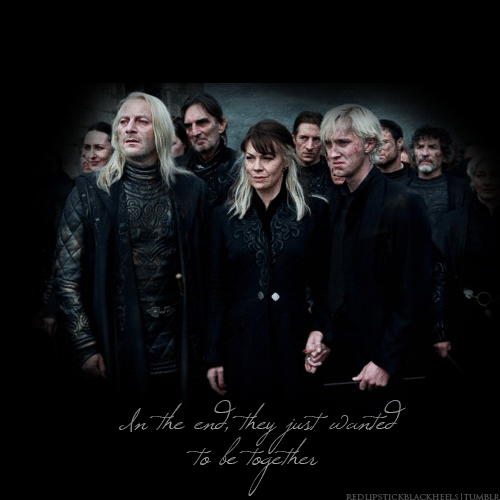
Index
A/N: I wrote this for my beautiful friend @the-hufflefluffwriter who loves Lucissa and helped me explore this ship. I loved writing this and I hope you like it as well <3
Lucius x Narcissa
Word count: 1530
Summary: Narcissa asks Lucius on a date.
Ever since he had gotten to Hogwarts, Lucius Malfoy walked about the school grounds like a dandy. He was handsome and intelligent, qualities he knew he possessed and was not afraid to flaunt them in and out of class. He kept mostly to himself and talked to a very selected few. This rubbed most students the wrong way, as they assumed the was just another stuck up, entitled pureblood.
Which he was, to an extent.
Lucius was raised to be the perfect heir of a long line of (mostly) pure blooded wizards and witches, after all. He behaved with the propriety and decorum he was expected to, but that was not the reason why he wouldn’t engage with most people.
In reality, he knew he wasn’t half as charming as he imagined himself to be. He could get really dorky about things he was passionate about, like potion making or reading. He was an expert in lots of random things. He knew the events of the XVI century’s witch hunts and Anne Boleyn’s biography by heart. He loved animals, especially peacocks and learned every fact about them. He was kind-hearted, sensitive and open to new ideas, characteristics his father scorned.
Through the years, Lucius had curated an image of perfection he wasn’t willing to lose. And he wasn’t going to let anyone use his true colours against him like his father did.
So, as he walked to the prefects’ carriage, his shiny new badge pinned to his robes, he procured to maintain his composure. Nobody could’ve guessed how proud and excited he was about his new position. His mask of poise fell for a minute when he saw who the other Slytherin prefect was.
Narcissa Black was probably the most popular girl in their year. She was beautiful and dignified, with the aristocratic flair that accompanied her last name. She was also brilliant and had a way with people that made her the centre of attention wherever she went. She was a beater and the star of the Slytherin quidditch team. Narcissa laughed and the world stopped to listen. She was everything Lucius tried to convey and wasn’t.
They had never talked to each other. Narcissa had a lot of suitors, but the only two boys she really talked to apart from her teammates were Rodolphus and Rabastan Lestrange, who dated her older sisters.
As he sat next to her, one single thought crossed his mind: Salazar, this is going to be very, very awkward.
…
“So, are you really thinking about filling your manor with albino peacocks?” she asked, laughter in her voice.
“Of course! They are beautiful, noble creatures. Once I’m the owner, I’ll have them everywhere,” he answered humorously and yet dead serious.
“What a joy to whoever marries you, Malfoy.”
As the months went by, Narcissa and Lucius struck up a very particular friendship. Little by little, he opened up to her. She was endeared by every arbitrary piece of knowledge he had to share with her. She loved how he listened intently to whatever she had to say and he’d ask real questions without ever being nosy. Narcissa found someone who understood her insecurities, someone who not only valued her wittiness but always had a perfect comeback for her. They were overly dramatic together, balancing the etiquette demanded by their families with playfulness.
Their nightly rounds suddenly became the highlight of their weeks. Every day, Lucius would try to find more creative ways to flirt. As the friendship grew, so did his attraction for Narcissa and he was dying to ask her out.
“That could be you, you know?” he said smugly.
Narcissa looked at him, an eyebrow raised. She knew Lucius liked her; he wasn’t subtle at all. And she liked him back, but she knew better than to show him that. Her sisters had taught her well.
“Oh, I know that approach too well, Malfoy. My mother warned me about guys like you.” She crossed her arms playfully.
“Oh, really? So, she warned you about handsome, intelligent and absolutely talented guys like me?” he shot back.
Narcissa laughed, a full-blown laugh that left her breathless. Lucius felt satisfied.
“No, you fool. She told me about those men, too eager to get a proper lady for a wife and a line of mistresses and bastards on the side,” she said dramatically.
It was Lucius’ turn to look at her as though she had gone mad. “And I am one of those?”
“Definitely.”
“Cissa, I can count with one hand the amount of people I talk to. If anything, you are the one who might be searching for a proper gentleman for a husband and a line of lovers on the side,” he countered.
“Not going to lie, I definitely like that idea. The swap of gender roles sounds refreshing,” she beamed back.
He shook his head as a smile played on his lips. “You’re going to be the death of me, Narcissa Black.”
Narcissa smiled. They were already walking back to the Slytherin common room. She knew everything her sisters had told her about not showing too much interest. Andromeda was particularly adamant about this; she had shown the slightest bit of interest for Rabastan and he acted smug for months before asking her out. But she wondered how long she’d have to wait before Lucius made a move. Narcissa didn’t know many more nights of playful banter she could take. Patience wasn’t her forte, as much as her father told her it was the most important quality to cultivate.
Her heart was beating fast on her chest when they arrived to their common room. She decided to get over with it already.
“Cissa.”
“Take me to Hogsmeade next weekend,” she blurted out. Her tone was demanding, not allowing the least beat of doubt to show on her features.
Lucius nodded slowly, not able to disguise his surprise at her bravery.
…
Lucius offered his arm to Narcissa, who linked it with hers. They were very close to each other, enough for her to notice how her date was shivering. It was snowing as they walk to Hogsmeade. Narcissa took the necessary precautions when she chose her garments for the day. She looked beautiful, as always, but she was also properly dressed for the weather. Lucius, on the other hand, had sacrificed comfort for style and now he was freezing to the bone and pretending like everything was fine.
Narcissa could tell he couldn’t wait to arrive at Madam Puddifoot’s and get his hands on steaming cup of tea. She decided it was her moment to act gallantly; she had asked him out, after all. She took off her green scarf and put it around his neck. Once again, Lucius was taken aback by her attitude, but he couldn’t deny the scarf made a big difference.
They smiled at each other sweetly, but she knew she couldn’t let this opportunity pass. She was loving the whole “princess charming and gentleman in distress” situation.
“You know, Malfoy? I love seeing you in my clothes.”
Lucius’ face was already too red from the cold for Narcissa to notice the blush, so he decided to play along with her. “You’ve seen nothing, Black. I’d look fabulous in one of your skirts.”
She giggled. “That confidence makes me think it wouldn’t be the first time you wear someone’s skirt.”
“It would be,” he said, “I’m just so handsome I can pull anything off.”
Narcissa rolled her eyes playfully.
“Your confidence, on the other hand, makes me think it isn’t the first time a guy uses your clothes,” he retaliated.
“Oh, it’s definitely not the first time,” she said offhandedly, noticing how Lucius’ confident smile vanished from his beautiful face. “My cousin Sirius looks so pretty in my dresses. You have no idea!”
Lucius snorted. He pushed the door to Madam Puddifoot’s. A tinkle announced their arrival. The place was tacky and over the top, with ribbons and frills in every possible pastel colour. It was, anyhow, classier than the Three Broomsticks and Lucius had wanted to take her on the very best date possible.
As they sat down, Lucius inched forward and whispered something that could’ve probably scandalized any other proper lady he knew: “You’d look great in my clothes, Black.”
“Oh, Malfoy,” she retorted, her smile hinting an incredibly witty response, “you’ll have to go to hell and back before I wear your clothes.”
…
Lucius woke up to an empty bed. He sat up, scanning the room in search of his wife. He noticed sounds coming from the bathroom and laid back, waiting for Mrs. Malfoy to emerge. Narcissa came back to their bed wearing Lucius’ robe. He smiled at the sight and open his arms for her. She gladly complied and snuggled to her husband.
“You know, Cissa?” whispered Lucius, never missing the chance to mess with his wife.
“Yes?”
“Going to hell and back wasn’t half as bad as I thought it would be,” he teased.
Narcissa filled the room with the wholehearted chortles only reserved for her husband and Lucius couldn’t feel any happier.
#lucissa#lucius malfoy#lucius malfoy x narcissa malfoy#narcissa malfoy#narcissa black#narcissa#lucius#lucius malfoy x narcissa black#lucius x narcissa#lucissa fic#lucissa fanfiction#lucissa fanfic#narcissa malfoy fluff#harry potter fluff#harry potter fanfiction#harry potter fanfics
121 notes
·
View notes
Text
ISLAM 101: Spirituality in Islam: Part 37
Futuwwa
Signifying chivalry, bravery and valour, futuwwa is a person’s not ascribing any virtue, right or superiority to their own self and is their viewing others as more important, worthy and esteemed than their own self. It is sacrifice, abnegation and valour. It is giving preference to the rights and interests of others purely out of humanitarian concerns, and self-sacrifice for the deliverance and happiness of society and all others. It is to provide help and do good without expectation of anything in return.
The Qur’an describes futuwwa, or spiritual chivalry, with the words, “They were young men who believed in their Lord, and We increased them in guidance (so they adhered to the truth more faithfully).” However, in the verse, “Some said: ‘We heard a young man make mention of them, who is called Abraham,'” futuwwa is ascribed to Prophet Abraham who smashed the idols the people worshipped to pieces. Each person’s idol is his or her own carnal soul (nafs al-ammara). A person who possesses spiritual chivalry in the true sense is the person who can oppose the idle passions and vain desires of their carnal soul.
Harawi refers to the essence of spiritual chivalry being a lack of self-worth and the refusal to see oneself as entitled in any way, and enumerates its three degrees:
The first is expelling hostility, overlooking small mistakes and misdeeds and forgetting the wrong done to you. The second is your sympathising with those who distance themselves from you, your treating with kindness those who mistreat you and your accepting the apology of one who wrongs you, not with anger but with lenience, not patiently but lovingly. The third is not concerning yourself with any proof on the spiritual path, not expecting anything in return and not being distracted by anything other than God in your witnessing (shuhud).
The first two degrees of this triadic classification entail a spiritual chivalry aimed at human relations. Accordingly, just as the first entails refraining from displaying enmity in human relations, a person’s overlooking faults and forgetting the mistreatment they have received, the second degree relates to a nobler level, with such elevated virtues as drawing near to those who have drawn away, showing kindness to those who have mistreated you, accepting apologies not by necessity but wholeheartedly, being highlighted.
On the basis of the Prophetic Tradition, “There is no fata (valiant young man) like ‘Ali and no sword like Dhu’l-Fiqar,” the Sufis have interpreted futuwwa as the total sum of virtues that need to exist in a young person.
Spiritual chivalry has been likened to a tree. As such, the roots of that tree are nourished with the sustenance of righteousness. Its trunk is carrying out acts of kindness and goodness to everyone. The branches of this tree represent cleanliness, its leaves modesty and shyness, its fruits the companionship of God’s friends, while its water is mercy.
Spiritual chivalry is, according to Abu al-Hasan al-Bushanji (348/960), “Your refraining from any action of which you would be ashamed of the Noble Scribes (kiramun katibun), who record your deeds, witnessing.” Ma’ruf al-Karkhi (200/815) says: “The people of spiritual chivalry possess three qualities: keeping faith without resistance and fidelity without fear; generosity without the thought of praise; and the ability to give without being asked.”
Abu ‘Ali al-Daqqaq defines spiritual chivalry as perpetually being attentive to the cares of others and being busy on their behalf. The hadith cited in the introduction to this article, “God will aid a servant [of His] so long as the servant aids his brother,” has served as a source of inspiration for the Sufis in this regard. Extending his observations further, al-Daqqaq has asserted that the Prophet is the highest representative of spiritual chivalry, as while everyone else will be preoccupied with their own troubles and say on the Day of Resurrection, “Me, Me,” he will say, “My community, my community!”
In reference to spiritual chivalry, ‘Abd al-Razzaq Kashani (730/1329), summates its central moral principles as forsaking enmity, avoiding faults, forgetting any wrongdoing towards one’s person, approaching not just those who are out of sight but also those who are out of mind, kindness to those who mistreat you, and accepting the pardon of those who do wrong.
The futuwwa concept is one which constitutes the sum total of knightly virtues that a Sufi needs to possess such as self-sacrifice, altruism, goodness, philanthropy, lenience and subduing one’s carnal self. When this point into taken into account, the notion of the Sufis’ having developed their own views of humanism within the framework of the futuwwa chivalric tradition, has also come into discussion.
Sulami is the author of a work exclusively devoted to spiritual chivalry. When his status as a great Sufi is taken into consideration, the role of the futuwwa concept in Sufism becomes much clearer. In this work, with paragraphs beginning with the requirements of spiritual chivalry, Sulami enumerates the themes that the concept encompasses. This is how the entire book is set out. Sulami highlights the inter-personal relationships between human beings and, as such, buttresses each and every issue he touches upon with examples from the Age of Happiness and the lives of the Predecessors. For the purposes of our discussion, a brief mention of the themes he examines in his study can be mentioned as follows:
Addressing the needs of one’s friends, responding to evil with goodness, not censuring others’ faults, refraining from seeking out the errors of others, possessing good character, establishing familiarity and closeness with people, being generous, maintaining old relationships, keeping one’s friends’ interests at heart, inviting guests, offering feasts and being hospitable, loving and frequenting one another for God’s sake, loving and caring for the poor, being truthful, keep one’s word and what is entrusted to one, striving to be righteous before appearing to be thus, sharing the joy of others, not expecting anything in return for any act of kindness, being repentant, loving God’s friends and not holding their shortcomings against them, being hardworking, treating people as one expects to be treated, constantly deeming one’s ego blameworthy, being preoccupied with one’s own faults and thus not being busy with the faults of others, being patient and resigned in the face of adversity and not expressing complaint, not wasting a single breath or moment, seeking the company of the good and avoiding the company of the evil, not being attached to worldly things, not quarrelling with one’s friends on account of worldly interests, ensuring an integrity between one’s inner and outer self, not lowering one’s state by making demands upon other people, controlling one’s lust and sexual desires, wishing for others what one wishes for oneself, preferring others to oneself, refraining from miserliness, being contented, correcting one’s state by correcting one’s actions, getting along well with and accepting others, expelling pride, self-conceit and all self-approval, behaving toward one’s friends in a way that will prevent them from doing something for which they would have to apologise, fleeing from jealousy, sparing no material or spiritual sacrifice, forgetting all the good done to others, being loyal, suppressing one’s anger, not betraying others, and being forever faithful in one’s friendships and relationships…
Emerging at this juncture are two dimensions of the futuwwa concept: the first is obedience to the Divine commands and proper worship, while the other is good character. That is to say, this is a futuwwa with the separate dimensions of human–God and human–human relations. While the former is a perfection realised via a consciousness of servanthood (‘ubidiyya), the latter is displaying a level of perfection in interpersonal human relationships. In this case then, fata becomes the individual who possesses an awareness of their servanthood to God and excellent and virtuous in their behaviour towards God’s creatures. Expected of the spiritual knight is not just generosity, kindness and helpfulness towards the believer, but for them to maintain this stance towards all creation.
Sulami asserts that it is proper for the Sufis to deport themselves according Sari al-Saqati’s (253/867) following description of them:
They firmly pursue five goals: never to be envious of what other people have, never to trouble other people, and always to control their hands, their stomachs, and their sexual desires. They are humble and they follow the ones who are superior to them in mystical knowledge.
Sulami’s reference to spiritual chivalry as a primordial human characteristic transmitted through the chain of Prophethood, plays an important role in grasping the value attached to spiritual chivalry by means of the religious criteria and qualities ascribed to it. As such, he defines spiritual chivalry as, “The repentance of Adam, the integrity and piety of Noah, the faithfulness of Abraham, the honest of Ishmael, the sincerity of Moses, the patience of Job, the generosity of David, the mercy of Muhammad, the devotedness of Abu Bakr, the modesty of ‘Uthman, the knowledge of ‘Ali.”
The following famous episode is one of the examples discussed under the subject of spiritual chivalry: A Magian guest once came to Prophet Abraham. Prophet Abraham said that he would entertain him on the condition that he surrender to God (accept Islam). So the Magian went his way. Then God Most High revealed to Abraham, “O Abraham, you have not offered food to the Magian as he has not changed his religion, while I have been providing for him for the past seventy years in spite of his unbelief. Could not you offer him even a single meal!” Upon this, Prophet Abraham immediately found the old man and entertained him. When the Magian asked Prophet Abraham why he had done so, the latter related everything that had happened. In response, the Magian asked, “Is this what God said to you in reference to me?” and became Muslim.
On one occasion, Shaqiq al-Balkhi (174/790) asked Ja’far al-Sadiq (148/765) about spiritual chivalry. When Ja’far al-Sadiq said, “What do you have to say in response to such a question?” Shaqiq al-Balkhi replied: “We are thankful when God bestows upon us a blessing and patient when He withholds a blessing.” “Our dogs in Madina do as much,” Ja’far replied. Shaqiq asked, “O descendant of God’s Messenger! What is spiritual chivalry in your view?” Ja’far said, “If we are given something, we give it to someone else, and if we are denied something, we give thanks.” This was spiritual chivalry according to him.
The extent to which a person who strives to be of help to those around them on the basis of the principle, “The human being is a slave to goodness,” will be loved by the people and be a superior representative of harmony and peace within their society, is self-evident.
#allah#god#islam#muslim#quran#revert#convert#convert islam#revert islam#reverthelp#revert help#revert help team#help#islamhelp#converthelp#prayer#salah#muslimah#reminder#pray#dua#hijab#religion#mohammad#new muslim#new revert#new convert#how to convert to islam#convert to islam#welcome to islam
2 notes
·
View notes
Text
Explorations of Samurai Champloo and why Fuu is the strongest character (in my opinion)
It’s such a powerful story: chance, luck, journey, your blood family and the family that you choose... your past, and almost one-shot or “drabbles” where each episode is some random adventure that doesn’t “flow,” but it does... in how in these random adventures, their friendship grows, each character grows, and they get one step closer to finding forgiveness, or redemption... peace from their past... so that each of the can move forward, on their own… “back to where they started.” It’s a very realistic take on life (even when it’s not). And because of the friendships and memories they created none them of the same anymore at the end. I find myself repeatingly being drawn back to Samuria Champloo—when I find myself back at a “forkway” in my own life—when I am sentimental about the goodbyes I have had to say, but also trying my best to move forward.... like Fuu, Mugen, and Jin.
1. Each character, in his or her own way, are somehow rebelling against the government. They refuse to obey in one way or another, rejecting the written rules that society has created. And yet Jin and Mugen are held to a some wisp of a young lady by an individual sense of duty they can’t ignore—a promise held down only through spoken word and understanding. When you really think about it, its almost ridiculous: Jin and Mugen are both two extremely powerful and dangerous men who have only relied on their own ability, strength, and words for survival. They both, for their own different reasons, reject the arbitrary rules and standards this new changing society is being built on... and yet, they are held to an innocent teenage girl by nothing more than a “pinky promise.” Furthermore, we are are constantly reminded of the importance connections and ties of family or groups, and yet in a world that money and contracts (written word) is increasingly becoming important, Jin, Mugen, and Fuu, who owe absolutely nothing to each other and aren’t family, are put through life and death experiences, and are delicately held together only by spoken word and understanding—by a pinky promise. It’s almost comical, and that’s espeically true in Mugen’s case (explored and more starkly highlighted in the episode where Mugen’s past is confronted). But that’s extremely powerful too, in a world in and age where only the written rules or words matter, here are people who still trying to do the right thing... abide by the unspoken rules of honor, duty, and virtue... even if for the initial reasons may be somewhat misguided or selfish.
2. Which brings us to the dynamic and growth of each character. Mugen and Jin are opposites; Mugen is the anti-hero and Jin is the traditional hero... the “perfect samurai.” So of course they hate each other; they each represent to each other what they despise or hate about the world. Jin believes in order, rules, and structure (although he rejects this new society where honor means nothing), and Mugen rejects society and all its rules because he’s the “lowest of the low;” he has no place in society so he forces his way through. And then there is Fuu, not a samurai herself, but the daughter of a samurai. And she’s the youngest, and the “weakest,” but also have the strongest heart. She isn’t tied down by titles or rules and from the beginning, never judges other by their title, appearances, or past: she has an open-mindedness that Mugen and Jin don’t have. No matter how much they try, both Mugen and Jin are still tied down by society and it’s rules... Mugen because he can never have a place, and Jin because he doesn’t know what his place is anymore. Mugen, no matter how hard he tries, cannot bring himself up... branded by his tattoos and his past. And you can see that through their dynamics. Jin is ironically, although the most quiet, is also the most honest (I owe this to his upbringing; he was trained to put emotions aside so his skills could progress, devoting one self completely to a cause greater than yourself. That doesn’t just happen; that comes only with hardwork and devotion). Mugen and Fuu are on the other hand, are much more emotional, with Mugen being the most dishonest; that although he is rather dumb and simple (where his actions always reveal what he is really feeling), he never actually speaks those truths. Mugen is brash and angry, bringing chaos wherever he goes... but that speaks to the hurt he is carrying.... hurt that he won’t ever admit to... maybe doesn’t even realize he is carrying (since that’s all he knows). Society rejects him, so he rebels through actions and chaos; forcing their acknowledgement, even if its scorn; kill or be killed. Fuu is dishonest too, but that is because she is young, immature, and scared. But she grows, and because of her heart and care, faces those fears and herself as well.
3. Which brings me back to Fuu. Fuu represents, to me, the power and hope of our youth. She’s not tied down by the same things the boys are; instead, she must struggle with how to bring forward the values of the samurai-- honor and a strong sense of duty-- into this new world. But she is young... and alone. She doesn’t have the same skills the boys do... so she must provide for herself another way: by asking for help and rely on others. And to many, that would be defined as weak, but that’s actually why I believe she is the strongest character. At every turn, she literally gambles her life on the whim of others... and she’s scared. It’s why she constantly nags them, and is so annoying (prompting them to abandon her at the beginning)-- she knows they could leave at any time. Her own blood father abandoned her and her mother... and her mother is died; she is no stranger to being left behind. And here she is, two strangers tied to her only with a flimsy promise that she helped save their lives once. She knows it’s a gamble, and due to her youth, can’t help but complain about it or get into throwing petty arguments at them. She’s insecure and scared, and she desperately doesn’t want them to leave her, but if her own mother and father left her... well... I think she knows this reality deeper than any of them. She’s pragmatic, although a bit crazy, and forgives extremely easily... being both selfish but never really caring about herself at the same time.
You see this when the first time they left her and they’re reunited at the brothel. Instead of scolding them for leaving her -- no use really -- she scolds them for not remember their promise not to kill each other. But it’s not Jin that comes back and saves the day.... it’s Mugen.... Mugen ,the “anti-hero.” Mugen, who has a flashback of her, and can’t ignore her, for whatever reason: honestly, their “duty” has probably already been fulfilled when they saved her the first time... thus the reason why Jin probably doesn’t save her (no need?). But Mugen relies on his instincts, and something about her he couldn’t ignore. Maybe it’s stubbornness... of never having to get by without any help from anyone, and here is some little bitch who decided to help him (psft, he doesn’t need her and refuses to be in debt to anyone), or because too... of who she was.. because of her overwhelming kindness and even bravery... and we see how she forgives people over and over for unforgivable things. And Mugen... deep downs... I think wants to be forgiven too... to be given a place.. to be cared for. And Fuu forges a place for both men; both men who were lost and passive... just... going with the flow, but Fuu, even though she was scared, took action, and took them along with her by sheer will. She saved them... even if they were the ones always saving her.
For Fuu was never afraid to speak up for what was right. Mugen had no means to “speak up” except to well… kill. Jin had no means either, except to protect the weak against corrupt lords and government. But it didn’t necessarily change much; still stuck and lost. But Fuu’s determination to never back down, and with the two protecting her, making sure her voice of justice didn’t (literally) die… maybe still, in the end, didn’t dramatically bring any change… it didn’t bring down the government or anything… but it did change them. It gave them all the courage and the ability to face and reconcile with their pasts. And throughout their whole journey… they were able to bring small changes and victories throughout the different places and people they touched… and that does, in the end, make a difference… even if it’s just small grain in the sand… but it’s still something. And Mugen... found peace... and even forgiveness... the “anti-hero” who ended up being the hero who helped Fuu complete her mission of meeting the samurai who smelled like sunflowers (while Jin was there to help clean up the remaining mess). Mugen didn’t believe he was worthy... for all his bark and fighting back, he was insecure too... no room for forgiveness.. that he was unloveable. But Fuu... believed in him, gave up her own selfishness so Mugen didn’t have to be alone (because they all understood each other quite well at the end). That was Mugen, and even Jin’s... way of thanking her, and giving her back love. Jin would have stayed with her; he would have been content with that I think. Maybe he didn’t find a master or lord to serve... didn’t find a cause to serve... but he found friends... and thus found a new definition of “how to serve.” Mugen, who never obeyed anyone, and never ruling over anyone else... willingly choose to sacrifice, willingly choose to listen to others... isn’t that love? And Fuu... who never tried to bend others to her will... she just accepted, let her own heart grow instead of trying to change others; let go of control, and ultimately... letting go of that control is what gave her freedom, I think.. to just accept others for who they are. And that acceptable, in the end, saved them all, I think. They were stronger together (when the boys rather just believe they could be strong on their own) and Mugen and Jin would have never been able to understand or see that, if it was not for Fuu.... bringing them together.
And just like in real life… may be we don’t always live to see how justice plays out… and we come to say goodbyes to the ones we love. But those small changes stay with us... and it makes us all stronger, as we move forward with the blood family we had no choice with, with the family & friends & actions we choose, and love throughout this journey.
9 notes
·
View notes
Text
996.
5k Survey LXVI
3351. True or false: When someone hates you it is because:
they're jealous of you?
the things you say are frightening to them because what you say makes them think about things they would rather avoid thinking about?
they don't understand you?
>> It could be any of those reasons, sure, but sometimes it really is about you, lmao. Sometimes you really can straight-up do something that makes someone else royally pissed off at you and you can choose to take responsibility for it or not.
3352. True or false: When you hate someone it is because:
you're jealous of them?
the things they say are frightening to you because what they say makes them think about things you would rather avoid thinking about?
you don't understand them?
>> I don’t hate anyone, per se, but there are people I’ve disliked for the first and third reasons (not too sure about the second, can’t think of any examples). I don’t make it their problem, though, because it obviously has more to do with me than them.
3353. Have you ever been fascinated by someone who hated you?
>> I don’t know. Gonna guess not, but it’s possible, I guess.
3354. Since the human brain has defense mechanisms against feeling bad (meaning the brain lies to itself to avoid feeling bad about something it said or did) how can we ever know if we are truly being honest?
How do we know our brains are not tricking us into believeing we are good people when we aren't all good?/
>> Well, I don’t bother with considering myself “good” in the first place, so at least there’s that. Being aware of the defenses and rationalisations that the brain invents to protect itself helps to remind me that just because I see a situation one way doesn’t necessarily mean that the other person’s viewpoint (where I was in the wrong) is wrong either.
3355. How highly do you value innovation?
>> I mean, not very? I like technology and shit but there are a lot of other things I wish society would focus on more intensely.
3356. Is there a name where all the people you've ever met haveing that name had something in common with each other(ex. all the jens you've ever met had blue eyes)?
>> I don’t know, I’ve never thought about this and it would take a lot of effort to try and think of a pattern like that right now.
3357. Are you focused more outward or inward?
>> Inward.
3358. What is the most affectionate nickname you ever came up with for someone?
>> Liebling is probably the most affectionate thing I’ve called someone.
3359. Are the questions STILL still interesting this deep into the survey?
>> The ratio of interesting to not-interesting questions is definitely skewing more towards the latter as it goes on. For me, at least.
3360. If someone else makes their desicions based on their intuition instead of on facts and proofs what do you think of that person?
>> I think of people on a case-by-case basis, and this isn’t a detailed enough example for me to make a judgement.
3361. Do you trust your own intuition?
>> I don’t know if I have any.
3362. Finish the phrase...
danger is the:
just keep:
never trust:
the way I live my life:
don't change:
maybe someday:
3363. Would you rather live in Frodo's world or Harry Potter's?
>> I find Tolkien’s realm far more interesting than Rowling’s. That isn’t to say I’d want to live there, though... well, maybe if I could be an elf... or a Maiar. IDK.
3364. Do you believe that the dead are with us? If yes in what form?
>> I haven’t formed an opinion. I, personally, have had no encounters with the dead that I know of (aside from Inworlders, of course).
3365. Do you believe that those who haven't been born are with us? If yes, in what form?
>> I’ve never even thought about this. That, I think, would make slightly less sense.
3366. Are you made of timid stuff?
>> I don’t think so?
3367. Is there anyone in this world who is not CRAZY?
>> ---
3368. What word becomes shorter when you add two letters to it?
>> Short.
3369. Can you mashed potatoe? Can you do the twist?
>> I can do the latter but not the former.
3370. What does your family do for thanksgiving..or if you don't celebrate it what do you picture when you think of thanksgiving?
>> Sparrow and I go to her parents’ house for Thanksgiving. Otherwise, I’d be perfectly content to not celebrate it at all (except to watch the parade highlights online, I guess, because I do still have a soft spot for that stupid thing).
3371. What is your earliest memory?
>> Mehhh.
3372. Have you ever taken an IQ test? What'd you get? What do you think of those things?
>> I was given one as a child, but I was never told the results. Which is just as well, because I grew up to despise the entire concept anyway.
3373. How do you make 'fishcakes'? Put the potatoe in the fish...
>> What?
3374. Which is the better band..the offspring or the damned?
>> I don’t care about “better”. I’m not familiar with The Damned (I know what they look like but not what they sound like), but I quite like The Offspring.
3375. Do you ever think about world destruction?
>> Not really.
3376. Do you think humans are becoming more robotic?
>> No?????
3377. Do you think we'll ever be replaced by robots?
>> That’s a really absurd concept to me, if I’m honest.
3378. What do you feel a part of?
>> Er.
3379. Does it freak you out to know that yogurt is ALiVe??
>> No, dude...
3380. What current band do you think is doing something particularly interesting or innovative?
>> Obviously my fave, Zeal & Ardor ~
3381. Golf course, do you remember?
>> What...
3382. Which is more important, books and cleverness or friendship and bravery?
>> ...
3383. If i promise to miss you, will you go away?
>> ........
3384. stool, ball, powder...Can you think of a 4th word that connects these three?
>> No.
3385. Who's afraid of the big bad wolf?
>> Hm.
3386. Why are blondes considered 'dumb'?
>> I don’t know how that got started, but you could always google it.
3387. What's more important..intuitiveness/creativity or factual knowledge and practicallity?
>> Why would one be more important than the other?
3388. Who are the two worst terrorists you can think of?
>> ...
3389. What is jello made of?
>> Bones. *shrug* idk, man.
3390. Pick a country: What do you believe is wrong with that country?
>> Wow.
3391. Do you have strong opinions?
>> Not usually.
3392. Do you do what it takes to stand up for those opinions?
>> If I manage to have an opinion about something, I don’t see why I would need to fight with anyone about it. If someone has an opposing opinion that makes me feel unsafe (you know, racist opinions, that sort of thing), then I make sure not to deal with those people.
3393. Have you ever been to a rally, protest or demonstration? If yes was it effective and in what ways?
>> Yeah. I don’t know if it was effective or not, it was so long ago I don’t even remember what it was for.
3394. When people say, 'yeah it sucks but there's nothing I can do' do you believe them?
>> I mean, yeah? A lot of things aren’t in the average person’s control.
3395. Do you know what you can do to make this world a better place? Do you care?
>> I’m not out to make this world a better place. Not to say that I want to actively make it worse, I just... am not focused on the world. I’m focused on my immediate life.
3396. Why is peace so important anyway? Why is freedom important?
>> ... I mean.........
3397. As long as you have your house and your family and you can go to the movies and the mall who cares about peace and freedom. Right?
>> That’s not my point of view, no.
3398.Do you try to avoid anything involving work?
>> Kind of, lmao.
3399. If you are not actively wrking to stop the horrors and injustices of the world (war, hunger, poverty) than aren't you partially responsible for them?
>> I don’t know, dude. Maybe I am. We’ll see how my points add up on Judgement Day, I guess.
3400. Are you in denial?
>> About what?
1 note
·
View note
Text
Erased
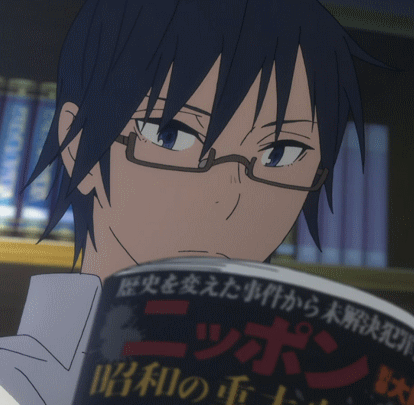
I was told this anime was pretty good by some of my friends but I didn’t really know what it is about. I think it was a little confusing to jump straight into episode 3 and it took me a little bit to understand what was going on, but it made sense pretty quickly. I typically really enjoy shows that have time-travel in them so I was excited when I realized that was a part of Erased. I also really enjoyed the art style and thought it was a good one to end on because it was pretty different than what we’ve seen in the past in my opinion.
One of the biggest themes that popped out to me was the idea of the value of stepping out of your shell and the need to sometimes put yourself in uncomfortable situations to change your life for the better. Satoru struggles a lot with expressing himself and putting himself out there to make friends. Eventually doing things that require bravery from him is what ends up allowing him to form connections with others and actually make friends. This is a really valuable lesson because it shows the importance of growing yourself and how that can help you to grow in other aspects of your life as well; in other words, improving yourself and subsequently, improving the relationships in your life as well. His friendships are essential to his success in the end, highlighting the importance of being able to rely on, trust others, and ask for help when necessary too.
Seeing how in the end, Satoru’s life is so much better and more fulfilling for himself when he changes his past is an interesting take. It’s hard because obviously we can’t go back and change the past, and a lot of the time we just have to do our best to accept our mistakes and what we regret from the past and move on from it. I do think it does give a grander message about being courageous in the present and doing our best to live without regrets now.
1 note
·
View note
Text
Why I Love Sophia Chang, The Baddest Bitch in the Room
“If you truly believe it, that energy emanates when you walk into a room. My hope is that someday every woman will feel as mightily about herself as we do.” - Sophia Chang
Baddest Bitch in the Room is a memoir written by Sophia Chang, a Korean-Canadian music manager of the Wu-Tang Clan, kung fu warrior, mother of two, and an influential leader in the Asian-American community. This book takes readers through her adventurous life, going through the ups and the downs in her entertainment and management career as well as personal experiences with romance and motherhood.
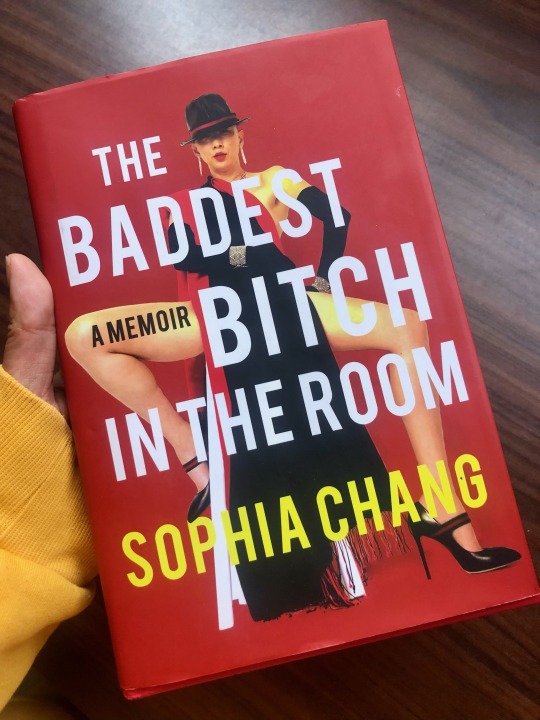
I first learned about Sophia when cruising through the rabbit hole of Youtube shortly after my college graduation. It must have been a video that was labeled “First Asian woman in hip-hop” which I thought was different and really awesome. Fast forward to learning about her non-profit, Unlock Her Potential, following her on the gram, and reading her memoir, I now want to recap the power she brings to the world through her confidence, ambition, and boldness.
Sophia embodies bravery. In her early 20's, she ventures out from her hometown Vancouver to begin a journey in New York, where she knows little to no one. In the East Coast, she networks her way through music artists she admires, driven by pure passion for music. She ends up meeting Wu-Tang Clan and they take her in as a family member immediately.
During her time working with the legendary hip-hop group, she built loyal friendship and family bonds while also being authentic, expressing her vulnerability, and spreading love wherever she went. Sophia navigated her own identity crisis and confronted the beauty of herself while witnessing the power of hip-hop to all marginalized communities.
“...Hip-hop was the first time I’d seen people of color telling their own stories as opposed to seeing them through the dominant white males lens of Hollywood. These artists were so physically assertive--stomping their feet, slapping their chests, and the ultimate B-boy stance: arms crossed high, hands tucked into the armpits, feet apart. This kind of unapologetic bearing was completely novel to me, an Asian woman who had been trained to shrink herself to accommodate others. It all spoke to an exhortation to be seen as they wanted to be seen. And unlike me, they were so proud of who and what they were."
I feel some Asian cultures encourage their women to shrink themselves to make them more invisible and attract less attention. The pressure to be quiet is damaging and causes us to erase our voice as well as devalue our own presence in every room we are in. Acknowledging her own fears, Sophia demands that each person’s voice has value at the table, especially her own. Her bold, unapologetic nature becomes a daily radical act as she blazes her own path.
The book takes readers through the grief of losing loved ones to death and highlights the importance of supporting those who battle with issues of addiction and mental health disorders. When I tie this in with All About Love by bell hooks, I am reminded of how addiction can be with drugs, alcohol, sex, money, and external validation. When the people we love are experiencing addiction or mental health problems, it’s important to always take it seriously and to also take care of ourselves to prevent the deterioration of our own well-being.
Another aspect of the book I found to be reveling was her desire to live for those who have passed. She took pain and grief and recycled that into abundant waste. Waste that was healing a wound and turning negative energy into positive energy. Sophia is an example of someone who understands suffering as a natural state of living, but actively transforms pain into opportunity in her mind and actions.
In addition, she entrances readers through her tumultuous love life and talks about missing a partner of many years: “I never wavered on my decision to leave, but swore that I still loved Yan Ming. I recalled all the magical moments -- the trip, the training, the children--they were real! And then I had a simple, stunning revelation: This isn’t love, Sophia, it’s nostalgia.”
For some reason, that line hit me so hard. Nostalgia?! Too accurate. I spend time missing people who have hurt me and reflect on the good times when the bad times were filled with just as much pain, anger, and trauma. Sophia was able to take a feeling I denied and put it exactly into words for me to confront that same reality.
“I try very hard not to be motivated by fear and I have my titanium confidence to thank for that...I am not allowing the dominant culture to tell me who I am; I am defining myself and telling the world who I am.”
What captivated me most about Sophia from the very beginning was her confidence and conviction. She has ambition, kindness, and an unapologetic boldness - balancing “living my best life” energy while also changing the world in every step. Overall, this memoir was a thorough read about an amazing adventure written by a brave and legendary woman. I look forward to seeing where life continues to take her! (And hopefully, for me to meet her as her mentee!)
0 notes